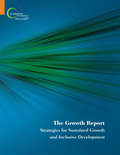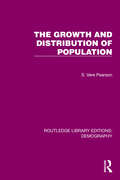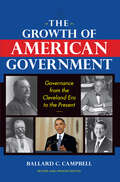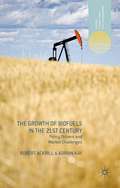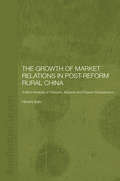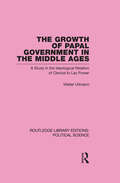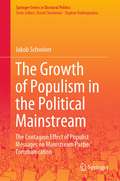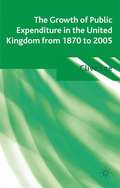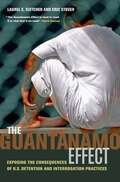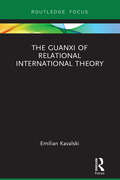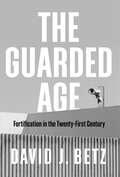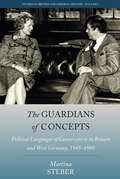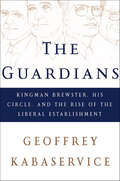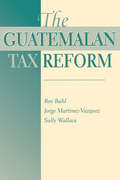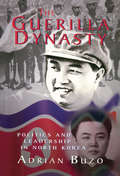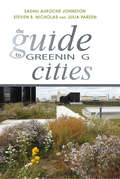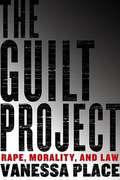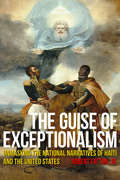- Table View
- List View
The Growth Report: Strategies for Sustained Growth and Inclusive Development
by Commission On Growth an DevelopmentWhy have only 13 developing world economies achieved sustained, high growth since World War II? Why is engagement with the global economy necessary to achieve high growth? Why do some countries' growth strategies fail to win the public's confidence? Why are equity and equality of opportunity important components of successful growth strategies? Why do many countries, blessed with natural resource wealth, not achieve high growth? Why has no country ever sustained rapid growth without high rates of public investment? Why does it not always pay to devalue the exchange rate? When does it? Why is childhood nutrition so important to economic growth? Why do some economies lose momentum when others keep on growing? Why has no country ever sustained long-term growth without urbanizing? Why should there be an end to energy subsidies? Why do global warming and the rising prices of food, energy and minerals pose challenges to potential future growth in developing countries? Why does the aging of the world population matter for developing countries growth and employment prospects? 'The Growth Report' does not have all the answers, but it does identify some of the key insights and policy levers to help countries achieve high, sustainable and inclusive growth. The result of two years work by 19 experienced policymakers and two Nobel prize-winning economists, 'The Growth Report' is the most complete analysis to date of the ingredients which, if used in the right country-specific recipe, can deliver growth and help lift populations out of poverty. About the Commission on Growth and Development Launched in April 2006, the Commission on Growth and Development brings together twenty-one leading practitioners from government, business, and the policymaking arenas, mostly from the developing world. The Commission is chaired by Nobel Laureate Michael Spence, former Dean of the Stanford Graduate Business School, and Danny Leipziger, Vice-President, World Bank, is the Commission's Vice-Chair. Over a period of two years the Commission sought to gather the best understanding there is about the policies and strategies that underlie rapid and sustained economic growth and poverty reduction. The Commission's audience is the leaders of developing countries. The Commission is supported by the Governments of Australia, Sweden, the Netherlands, and United Kingdom, the William and Flora Hewlett Foundation, and the World Bank.
The Growth and Distribution of Population (Routledge Library Editions: Demography #10)
by S. Vere PearsonOriginally published in 1935, this book examines the causes of global rural depopulation, slum housing conditions and city over-crowding. The falling birth-rate in the West, town planning, ribbon development, emigration and traffic problems are also discussed with particular focus on how they affect the growth and distribution of populations. Social, psychological and economic factors are all considered, as well as those dependent on physical geography.
The Growth of American Government: Governance from the Cleveland Era to the Present (Interdisciplinary Studies in History)
by Ballard C. CampbellHow and why has government gotten bigger? “Should be a compulsory assignment for any seminar on modern political culture.” —The Journal of American HistoryAmerican government has evolved over the generations since the mid-nineteenth century. The changing character of these institutions is a critical part of the history of the United States.This engaging survey focuses on the evolution of public policy and its relationship to the constitutional and political structure of government at the federal, state, and local levels. A new chapter in this revised and updated edition also examines the debate about “big government” in recent decades.“A marvelous multidisciplinary synthesis that builds on the findings of historians of national, state, and local government, along with those of economists and political scientists, to provide a coherent account of the rise of modern American governing structures.” —Journal of Interdisciplinary History
The Growth of Biofuels in the 21st Century
by Robert Ackrill Adrian KayThis book provides a timely and insightful analysis of the expansion of biofuels production and use in recent years. Drawing on interviews with key policy insiders, Ackrill and Kay show how biofuels policies have been motivated by concerns over climate change, energy security and rural development.
The Growth of Market Relations in Post-Reform Rural China: A Micro-Analysis of Peasants, Migrants and Peasant Entrepeneurs (Routledge Studies on the Chinese Economy)
by Hiroshi SatoThis book, based on in-depth field research at the local level, assesses the different factors that are contributing to the transition to a market economy and the growth of networks in rural China. It analyses the different socio-economic actors - peasant households, out-migrants, family businesses and peasant entrepreneurs, uses the key concept of markets as a nexus of social networks, and identifies three different kinds of 'social capital' - human capital, political capital/status, and network capital.This book demonstrates the importance of socio-political networks and highlights significant regional differences.
The Growth of Papal Government in the Middle Ages: A Study In The Ideological Relation Of Clerical To Lay Power (Routledge Library Editions: Political Science #35)
by Walter UllmannThis book reveals how the medieval papacy grew from modest beginnings into an impressive institution in the Middle Ages and deals with a wide field. It charts the history of the papacy and its relations to East and West from the 4th to the 12th centuries, embraces such varied subjects as law, finance, diplomacy, liturgy, and theology. The development of medieval symbolism is also discussed as are the view of eminent political scientists of the period. This re-issues reprints the revised, 3rd edition of 1970.
The Growth of Populism in the Political Mainstream: The Contagion Effect of Populist Messages on Mainstream Parties’ Communication (Springer Series in Electoral Politics)
by Jakob SchwörerThis book examines the populist communication of mainstream parties in Germany, Austria, Italy, and Spain. For a long time, populist and radical right parties have been the main subject of investigation in academic research. Yet, how mainstream parties react to the rise of such actors is less known. Scholars assume a “populist Zeitgeist”, a populist contagion claiming that the political mainstream actively engages in populist and nativist discourses. The author tests this widespread assumption analyzing whether center-left and center-right mainstream parties adopt populist messages, as well as content related to the leftist and right-wing host ideologies of populist actors. Therefore, this book is a must-read for scholars, students, and researchers of political science and electoral studies, as well as policy-makers and practitioners interested in a better understanding of populism and populist communication.
The Growth of Public Expenditure in the United Kingdom from 1870 to 2005
by Clive LeePublic expenditure has increased considerably in the UK from around ten per cent of GDP in the 1870s to forty per cent and above in the 21st century. Clive Lee explores the fluctuations in state spending, highlighting the ongoing political conflict over the size and extent of welfare provision.
The Guantánamo Effect: Exposing the Consequences of U. S. Detention and Interrogation Practices
by Laurel E. Fletcher Eric StoverThis book, based on a two-year study of former prisoners of the U.S. government's detention facility at Guantaacute, Cuba, reveals in graphic detail the cumulative effect of the Bush administration's "war on terror."
The Guantánamo Lawyers: Inside a Prison Outside the Law
by Jonathan HafetzThe stories of Guantánamo detainees, silenced and imprisoned without trial, as told by their lawyersFollowing the terrorist attacks of 9/11, the United States imprisoned more than seven hundred and fifty men at its naval base at Guantánamo Bay, Cuba. These men, ranging from teenage boys to men in their eighties from over forty different countries, were detained for years without charges, trial, and a fair hearing. Without any legal status or protection, they were truly outside the law: imprisoned in secret, denied communication with their families, and subjected to extreme isolation, physical and mental abuse, and, in some instances, torture.These are the detainees’ stories, told by their lawyers because the prisoners themselves were silenced. It took habeas counsel more than two years—and a ruling from the United States Supreme Court—to finally gain the right to visit and talk to their clients at Guantánamo. Even then, lawyers were forced to operate under severe restrictions designed to inhibit communication and envelop the prison in secrecy. In time, however, lawyers were able to meet with their clients and bring the truth about Guantánamo to the world.The Guantánamo Lawyers contains over one hundred personal narratives from attorneys who have represented detainees held at “GTMO” as well as at other overseas prisons, from Bagram Air Base in Afghanistan to secret CIA jails or “black sites.” Mark Denbeaux and Jonathan Hafetz—themselves lawyers for detainees—collected stories that cover virtually every facet of Guantánamo, and the litigation it sparked. Together, these moving, powerful voices create a historical record of Guantánamo’s legal, human, and moral failings, and provide a window into America’s catastrophic effort to create a prison beyond the law.An online archive, hosted by New York University Libraries, will be available at the time of publication and will contain the complete texts as well as other accounts contributed by Guantánamo lawyers. The documents will be freely available on the Internet for research, teaching, and non-commercial uses, and will be preserved indefinitely as a historical collection.
The Guanxi of Relational International Theory
by Emilian KavalskiThis book offers a relational theory of International Relations (IR). To show the ways in which the relationality is foreshadowed in IR conversations it makes the following three points: 1) it recovers a mode of IR theorizing as itinerant translation; 2) it deploys the concept and practices of guanxi (employed here as a heuristic device revealing the infinite capacity of international interactions to create and construct multiple worlds) to uncover the outlines of a relational IR theorizing; and 3) it demonstrates that relational theorizing is at the core of projects for worlding IR. By engaging with the phenomenon of relationality, Emilian Kavalski invokes the complexity of possible worlds and demonstrates new possibilities for powerful ethical-political innovations in IR theorizing. Thus, relational IR theorizing emerges as an optic which both acknowledges the agency of ‘others’ in the context of myriad interpretative intersections of people, powers, and environments (as well as their complex histories, cultures, and agency) and stimulates awareness of the dynamically-intertwined contingencies through which meanings are generated contingently through interactions in communities of practice. The book will have a strong appeal to the broad academic readership in Asian Studies, Political Science, Comparative Politics, International Relations theory and students and scholars of non-/post-Western International Relations and non-/post-Western Political Thought.
The Guard
by Kiera CassBefore America Singer met Prince Maxon . . .Before she entered the Selection . . .She was in love with a boy named Aspen Leger.Don't miss this digital original novella set in the captivating world of Kiera Cass's #1 New York Times bestselling Selection series. This brand new 64-page story begins just after the group of Selected girls is narrowed down to the Elite and is told from Aspen's point of view. The Guard also features a teaser to The One, the thrilling third novel in the Selection series.
The Guarded Age: Fortification in the Twenty-First Century
by David J. BetzThe fall of the Berlin Wall in 1989 came to symbolize the dawn of a new era of openness and connectivity. Yet today, the world is ever more divided, demarcated, and – quite literally – fortified. We are living in a guarded age. Why and how has this happened? Where will it take us? In this book, David J. Betz explores the expansion of fortified physical infrastructure at every level of the global political economy. In cities, where security is increasingly ‘designed in’ to public buildings and spaces as they are reshaped to mitigate mass terror attacks. Within corporations, who are burying their electronic assets in deep underground caverns and behind the leaded walls of ex-nuclear war bunkers against a range of threats and feared contingencies. In many urban areas, where the default condition of civil life is to be walled, gated, watched, and guarded. Year after year, hundreds of miles of linear obstacles – walls, ditches, and watchtowers – are added to national borders. Practically everywhere you look there are signs of innovative fortification, often designed to be overlooked. The Guarded Age reveals the barriers which most have observed but few – until reading this book – have truly seen.
The Guardian
by Patrice DutilFinance departments have often been portrayed as guardians of the public purse. In The Guardian, a multidisciplinary group of contributors examines the Ministry of Finance of Ontario since the Second World War. During the last sixty years the Ministry was transformed from a relatively small 'Treasury' to a sophisticated policy machine. What started as a modest bookkeeping operation evolved into a key bureaucratic and policy agency as the government of Ontario assumed a leadership position in developing the province.These essays reveal Ontario's 'finance' as a dynamic policy issue shaped by the personalities of premiers and ministers, the energies of public servants at all levels, and a critical dialogue between political and administrative worlds. Drawing on different methodologies, this collection profiles a ministry as policy entrepreneur, spender, revenue generator, capacity builder, budget director, program manager, and intergovernmental agent. The Guardian fills a significant gap in public administration literature and in so doing describes how Ontario's Ministry of Finance defined its role as 'guardian.'
The Guardian of the Constitution: Hans Kelsen and Carl Schmitt on the Limits of Constitutional Law
by Lars VinxThis volume provides the first English translation of Hans Kelsen's and Carl Schmitt's influential Weimar-era debate on constitutional guardianship and the legitimacy of constitutional review. It includes Kelsen's seminal piece, 'The Nature and Development of Constitutional Adjudication', as well as key extracts from the 'Guardian of the Constitution' which present Schmitt's argument against constitutional review. Also included are Kelsen's review of Schmitt's 'Guardian of the Constitution', as well as some further material by Kelsen and Schmitt on presidential dictatorship under Article 48 of the Weimar Constitution. These texts show Kelsen and Schmitt responding to one another, in the context of a debate focused on a concrete constitutional crisis, thus allowing the reader to assess the plausibility of Kelsen's and Schmitt's legal and constitutional theories.
The Guardians of Concepts: Political Languages of Conservatism in Britain and West Germany, 1945-1980 (Studies in British and Imperial History #9)
by Martina SteberSince 1945, what ‘conservative’ means has troubled intellectuals, politicians and parties in the United Kingdom and West Germany. In Britain conservatism was an accepted term of the political vocabulary, denoting a particular tradition of political thought and practice. In West Germany, by contrast, conservatism was a difficult concept for the young democracy to swallow. It carried a heavy antiliberal and antidemocratic burden and led people to question whether there was a place for conservatism within democratic culture after all. The Guardians of Concepts scrutinizes the debates about conservatism in the UK and the Federal Republic of Germany from the late 1940s to the early 1980s. Informed by historical semantics, it conceives of conservatism as a flexible linguistic structure, and shows the importance of language for the self-understanding of many conservatives, who not by chance, have regarded themselves as the guardians of concepts. The intense national and transnational debates about the meaning of conservatism had far-reaching consequences and continue to influence politics today.
The Guardians: Kingman Brewster, His Circle, and the Rise of the Liberal Establishment
by Geoffrey KabaserviceHow liberalism and one of the most dramatic eras in American history were shaped by an influential university president and his powerful circle of friendsYale's Kingman Brewster was the first and only university president to appear on the covers of Time and Newsweek, and the last of the great campus leaders to become an esteemed national figure. He was also the center of the liberal establishment—a circle of influential men who fought to keep the United States true to ideals and extend the full range of American opportunities to all citizens of every class and color. Using Brewster as his focal point, Geoffrey Kabaservice shows how he and his lifelong friends—Kennedy adviser McGeorge Bundy, Attorney General and statesman Elliot Richardson, New York mayor John Lindsay, Bishop Paul Moore, and Cyrus Vance, pillar of Washington and Wall Street—helped usher this country through the turbulence of the 1960s, creating a legacy that still survives. In a narrative that is as engaging and lively as it is meticulously researched, The Guardians judiciously and convincingly reclaims the importance of Brewster and his generation, illuminating their vital place in American history as the bridge between the old establishment and modern liberalism.
The Guardians: The Sunday Times Bestseller
by John GrishamFRAMED FOR MURDER. FIGHTING FOR JUSTICE.Twenty-two years ago, Quincy Miller was framed for murder - now he wants justice.Accused of killing his divorce lawyer, he's serving life without parole. There were no reliable witnesses and no solid evidence in the case. Enter Cullen Post: he's helped to exonerate eight men and he intends to make Miller the ninth.But powerful and ruthless people were behind this murder - and they're not about to let Miller walk free without a fight...💥350+ million copies, 45 languages, 10 blockbuster films: JOHN GRISHAM IS THE MASTER OF THE LEGAL THRILLER 💥Readers love The Guardians:'A masterful book' ⭐⭐⭐⭐⭐ 'A constant page-turner' ⭐⭐⭐⭐⭐ 'Kept me gripped' ⭐⭐⭐⭐⭐ 'Fantastic read' ⭐⭐⭐⭐⭐ 'Grisham strikes again - an absolute must-read' ⭐⭐⭐⭐⭐
The Guatemalan Tax Reform
by Roy BahlResponding to a deepening economic crisis, serious structural problems with the tax system, a long and deep-seated opposition to even modest tax increases, and a weak tax administration, the Guatemalan government introduced a comprehensive tax reform program in 1992. In this concise volume, experts present analysis that supported the reform program and evaluate the first round of revenue and tax-burden effects. Responding to a deepening economic crisis, serious structural problems with the tax system, a long and deep-seated opposition to even modest tax increases, and a weak tax administration, the Guatemalan government introduced a comprehensive tax reform program in 1992. In this concise volume, Roy Bahl, Jorge Martinez-Vazquez, and Sally Wallace review the data that supported the creation of the reform program and evaluate the first round of revenues and tax-burden effects.Focusing their theoretical and empirical analysis on revenue yield impacts, on effects of relative prices and relative tax treatment of different types of companies, and on the distribution of tax burdens by income class, the authors factor in individual and company income taxes, value-added tax, taxes on international trade, and property tax. In each case, they describe the existing tax system and evaluate it against the traditional norms; in addition, they analyze alternative structural reforms within the Guatemalan context.Comprehensive tax reforms in less developed countries are infrequent, and the Guatemalan experience provides a fascinating case study of how modern analytic techniques can be used by policymakers to formulate tax structure changes. The authors also draw contrasts with experiences in other countries and revisit many of the principles that have been laid down for guiding tax reforms in developing nations.
The Guerilla Dynasty: Politics And Leadership In North Korea
by Adrian BuzoThroughout the 1990s, North Korea has operated under a skeptical international eye, due largely to the countrys rigorous self-imposed isolation, its on-going confrontation with South Korea, a controversial nuclear arms program, and the near-total collapse of its economy. North Koreas leaders have chosen to face the world with its Stalinist political culture and ideological framework intact, for better or worseand by most reports, almost exclusively for the worst. How did this situation come to be, and what are its consequences? In The Guerilla Dynasty, Adrian Buzo gives us an accessible, up-to-date, and rigorously researched account of the political, economic, and foreign policy developments in North Korea since 1945.
The Guide to Greening Cities
by Sadhu Aufochs Johnston Steven S. Nicholas Julia ParzenSuperstorm Sandy sent a strong message that a new generation of urban development and infrastructure is desperately needed, and it must be designed with resilience in mind. As cities continue to face climate change impacts while growing in population, they find themselves at the center of resilience and green city solutions, yet political and budgetary obstacles threaten even the best-planned initiatives. In The Guide to Greening Cities, seasoned green city leaders Sadhu Johnston, Steven Nicholas, and Julia Parzen use success stories from across North America to show how to turn a green city agenda into reality. The Guide to Greening Cities is the first book written from the perspective of municipal leaders with successful, on-the-ground experience working to advance green city goals. Through personal reflections and interviews with leading municipal staff in cities from San Antonio to Minneapolis, the authors share lessons for cities to lead by example in their operations, create programs, implement high-priority initiatives, develop partnerships, measure progress, secure funding, and engage the community. Case studies and chapters highlight strategies for overcoming common challenges such as changes of leadership and fiscal austerity. The book is augmented by a companion website, launching with the publication of the book, which offers video interviews of municipal leaders, additional case studies, and other resources. Rich in tools, insights, and tricks of the trade, The Guide to Greening Cities helps professionals, policymakers, community leaders, and students understand which approaches have worked and why and demonstrates multidisciplinary solutions for creating healthy, just, and green communities. Visit the companion webiste to the book-http://guidetogreeningcities. org/
The Guilt Project: Rape, Morality, and Law
by Vanessa PlaceAn English court in 1736 described rape as an accusation "easily to be made and hard to be proved, and harder to be defended by the party accused, though never so innocent." To prove the crime, the law required a woman to physically resist, to put up a "hue and cry," as evidence of her unwillingness. Beginning in the 1970s, however, feminist and victim-advocacy groups began changing attitudes toward rape so the crime is now seen as violent in itself: the legal definition of rape now includes everything from the sadistic serial rapist to the eighteen-year-old who has consensual sex with a fourteen-year-old. This inclusiveness means there are now more rapists among us. And more of rape's camp followers: the prison-makers, the community watchdogs, law-and-order politicians, and the real-crime/real-time entertainment industry. Vanessa Place examines the ambiguity of rape law by presenting cases where guilt lies, but lies uneasily, and leads into larger ethical questions of what defines guilt, what is justice, and what is considered just punishment. Assuming a society can and must be judged by the way it treats its most despicable members, The Guilt Project looks at the way the American legal system defines, prosecutes, and punishes sex offenders, how this Dateline NBC justice has transformed our conception of who is guilty and how they ought to be treated, and how this has come to undo our deeper humanity.
The Guilty Feminist: You Don't Have to Be Perfect to Overthrow the Patriarchy
by Deborah Frances-Whitep.p1 {margin: 0.0px 0.0px 0.0px 0.0px; font: 12.0px 'Times New Roman'} A witty take on feminism for every woman who wants equality but sometimes wants a day off from fighting for it p.p1 {margin: 0.0px 0.0px 0.0px 0.0px; font: 12.0px 'Times New Roman'} p.p2 {margin: 0.0px 0.0px 0.0px 0.0px; font: 12.0px 'Times New Roman'; min-height: 15.0px} Sometimes we feel a bit like "I'm a feminist, but..." As in, "I'm a feminist, but I skipped the Women's March to buy face cream." As in, "I'm a feminist, but I've never found time to read Sylvia Plath (but I have watched fifteen seasons of Keeping Up with the Kardashians)." In The Guilty Feminist, Deborah Frances-White reassures us that we don't have to be perfect to be a force for meaningful change. Exploring big issues of identity, equality, intersectionality, and the current feminist agenda, she explodes the myth of the model activist and offers a realistic path toward changing the world.
The Guise of Exceptionalism: Unmasking the National Narratives of Haiti and the United States (Critical Caribbean Studies)
by Robert FattonThe Guise of Exceptionalism compares the historical origins of Haitian and American exceptionalisms. It also traces how exceptionalism as a narrative of uniqueness has shaped relations between the two countries from their early days of independence through the contemporary period. As a social invention, it changes over time, but always within the parameters of its original principles.
The Gujarat Carnage
by Asghar Ali EngineerIn February 2002, 59 Hindu pilgrims were burnt alive in a rail coach at Godhra. The National Human Rights Commission investigated the episode. This is a compilation of reports, surveys, and other significant material on the carnage.
